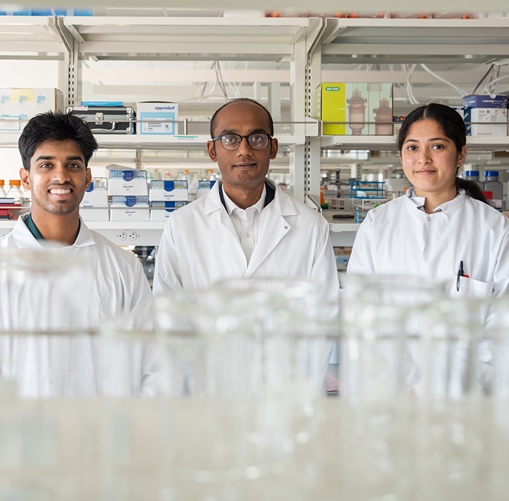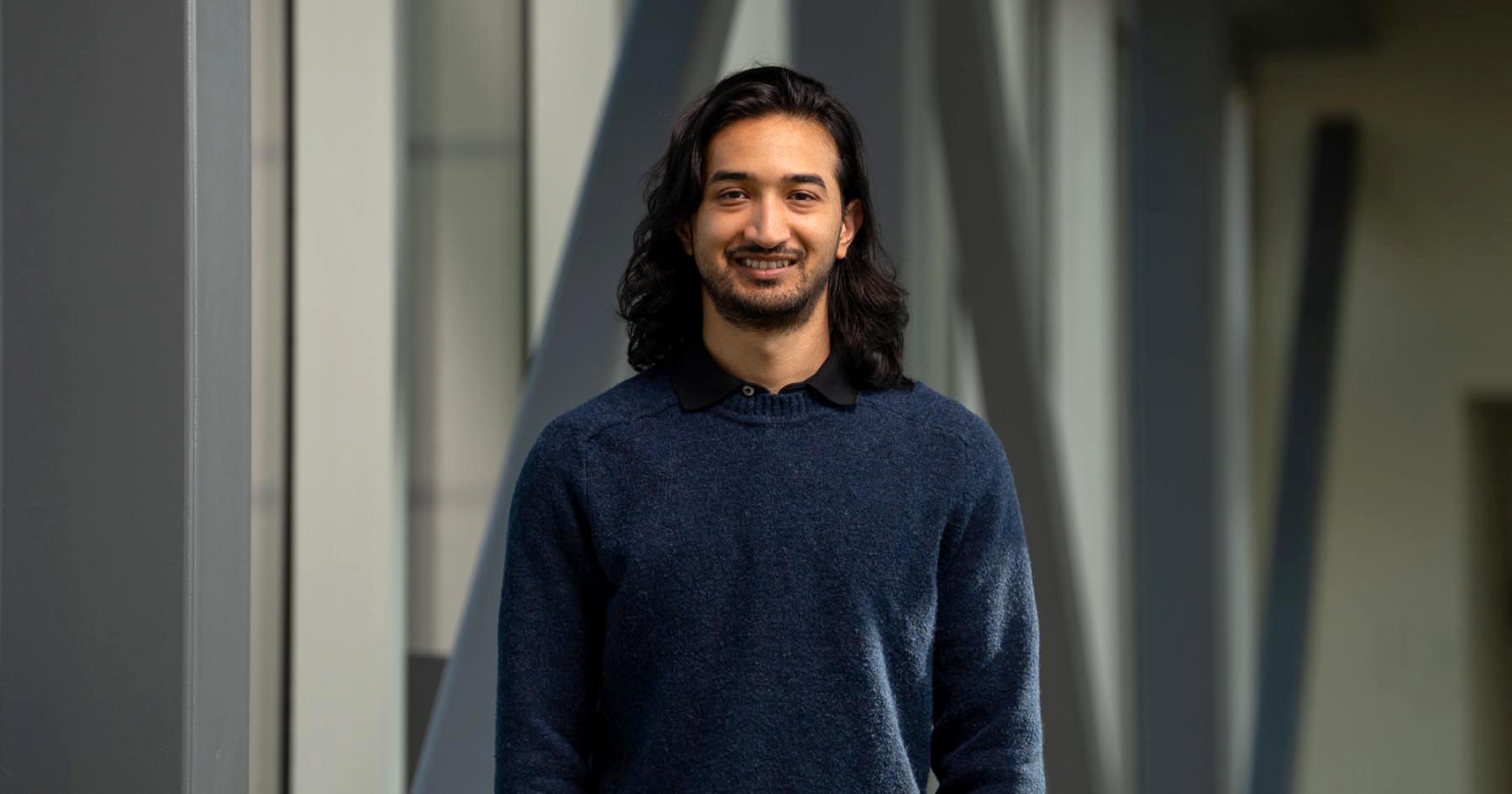Animal sciences students gain hands-on experience through summer internships
As the first month of the fall semester comes to an end, many students are already beginning their search for summer 2026 internships. Internships are important for students to gain hands-on experiences in their areas of interest.
Our students gained valuable insights this past summer through internships across the country. Their stories highlight the impact of hands-on learning and the variety of opportunities available to Purdue Animal Sciences students.
Read more to see the hands-on experiences our students gained this summer.
Will Eberhart - Anatomical Pathology Intern, Labcorp (Greenfield, Indiana)
Will Eberhart, a senior in animal sciences with a concentration in biosciences, spent his summer as an anatomical pathology intern at Labcorp, a global life sciences and healthcare company. There, he supported pre-clinical drug trial development by performing necropsies, tissue trimming and embedding and microtomy.
Eberhart said the experience solidified his career goals.
“I’ve wanted to be a veterinarian for as long as I can remember, but I realized in high school that pathology was what I wanted to pursue," Eberhart said. "I liked the case study aspect—figuring out what happened and why.”
Eberhart’s favorite part of the internship was seeing the long path of drug development.
“The medicines I worked on had been in development for years, and it will take many more before they ever reach the market,” Eberhart said. “It gave me perspective on the impact pathologists have, even if their work isn’t visible right away.”
Eberhart believes internships are vital for animal sciences students.
“They give you real-world experience you can’t always get on campus,” Eberhart said. “My internship helped me confirm the field I want to pursue and exposed me to every aspect of the process.”
Eberhart plans to attend veterinary school after completing his bachelor’s degree, with the goal of becoming a veterinary pathologist.
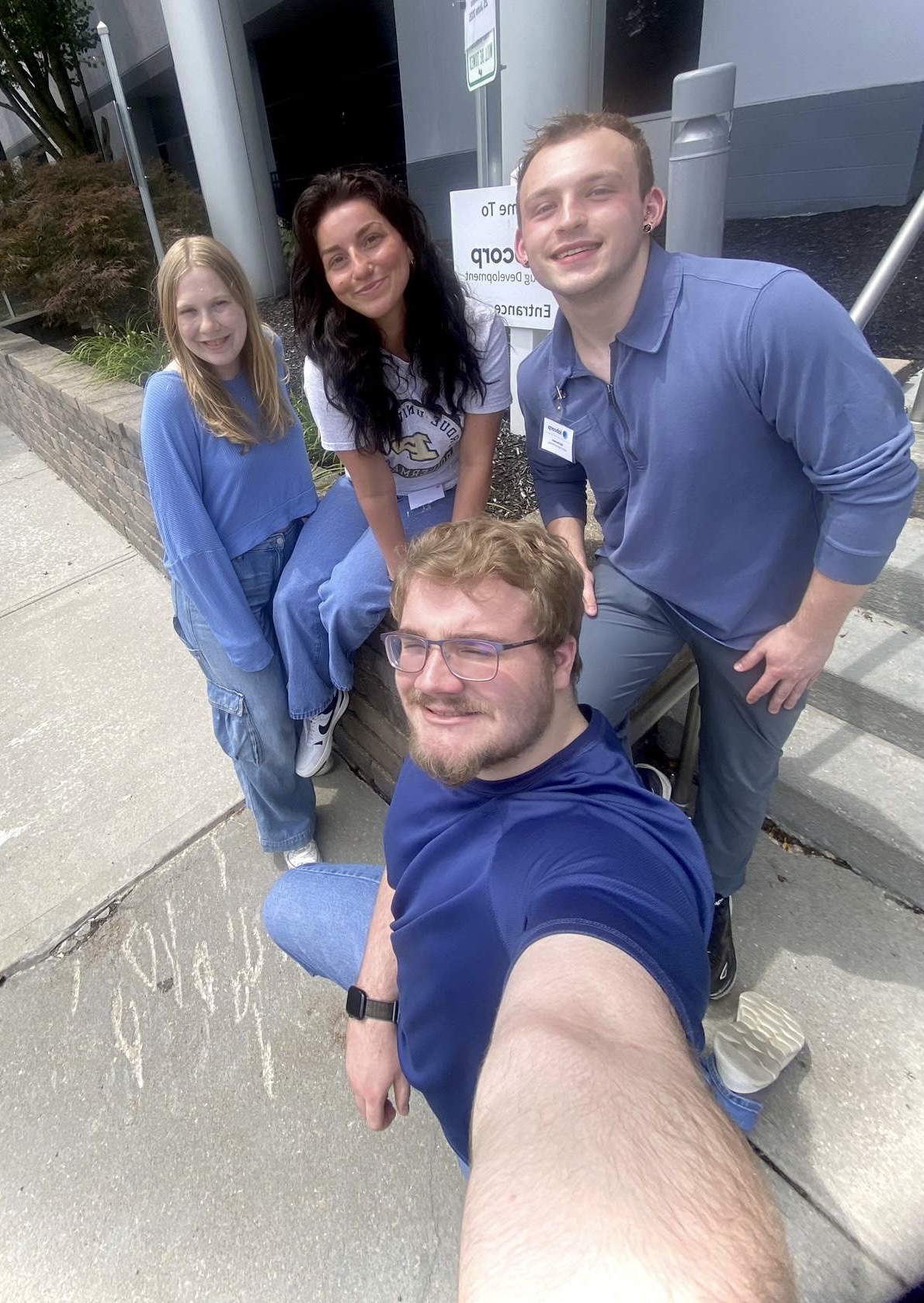 From left to right: Lillian Andis, Cassidy Hayes, Matthew Johnson, Will Eberhart
From left to right: Lillian Andis, Cassidy Hayes, Matthew Johnson, Will Eberhart 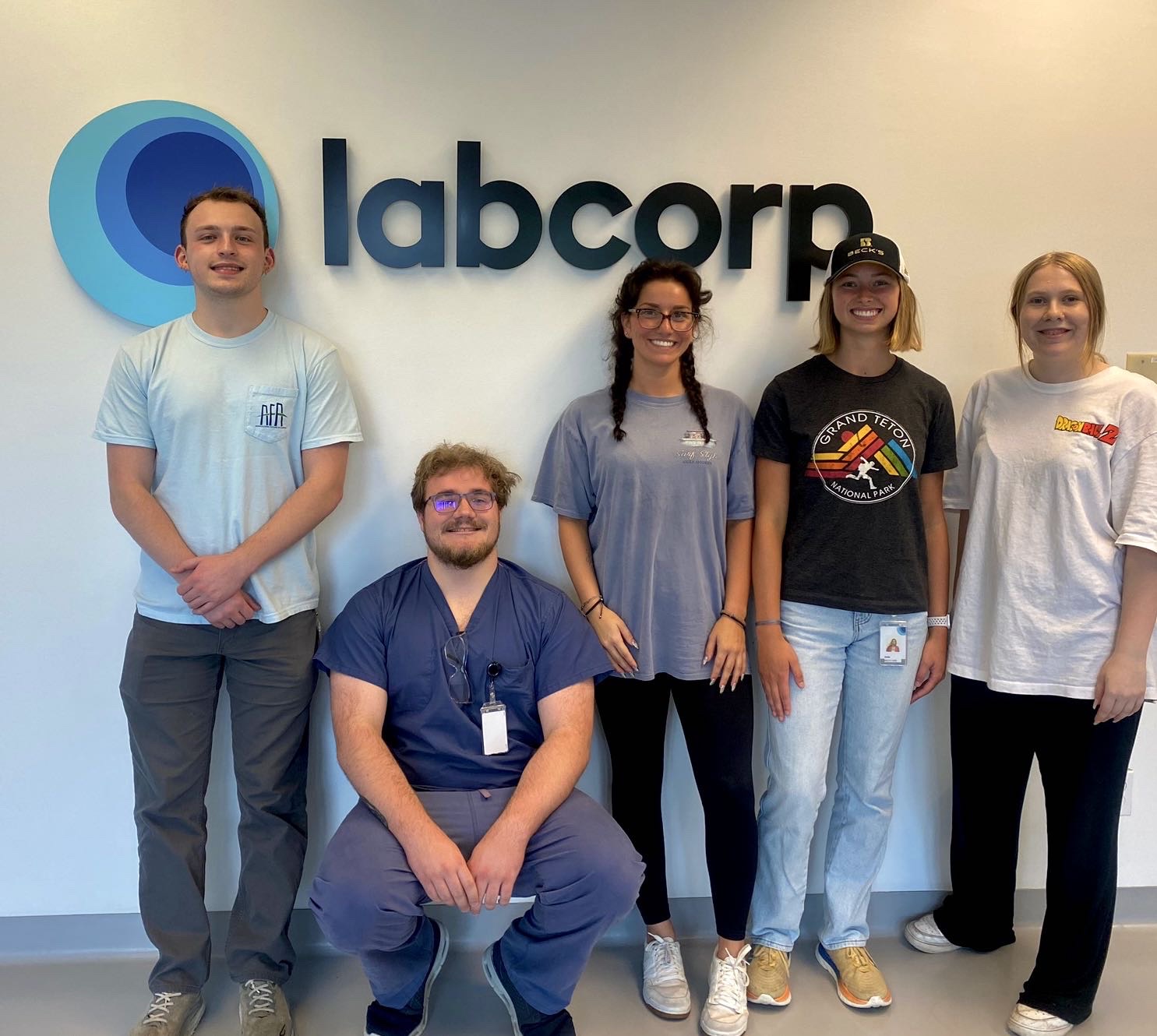 From left to right: Will Eberhart, Matthew Johnson, Cassidy Hayes, Stella Houchins, Lillian Andis
From left to right: Will Eberhart, Matthew Johnson, Cassidy Hayes, Stella Houchins, Lillian Andis Sydnie Frost - REEVES Scholar, University of Georgia (Athens, Georgia)
Sydnie Frost, a senior in animal sciences with a concentration in biosciences, spent her summer as a REEVES Scholar at the University of Georgia. She was one of two Purdue Animal Sciences students in the program, alongside senior Samuel Piper, who worked at Kansas State University. Both presented their research at the Livestock Insect Workers Conference in Cody, Wyoming.
“My personal research project was focusing on basically mortality rate or the effectiveness of larvicides for mosquitoes,” Frost said. “We took two different types of mosquitoes, and we wanted to see if you could use these larvicides at a low concentration and have the same mortality rate than using it at a high concentration.”
This was Frost’s first time conducting lab research outside of a classroom setting.
“With this research, I was pretty independent, so I was able to use my lab skills such as pipetting, doing simple calculations and knowing how to structure a lab notebook,” Frost said. “If I hadn’t had that experience at Purdue, I would have been completely lost.”
Frost also gained a new respect for Extension programs and their role in supporting the general public. She recommends the REEVES program to other students.
“I learned how to network and talk to people that are older and wiser. It can be nerve-wracking going up to them but picking their brains was so valuable,” Frost said. “Any kind of internship that takes you out of your comfort zone, especially out of state, forces you to be more independent, and I think that’s good for anybody.”
After graduation, Frost plans to pursue graduate school.

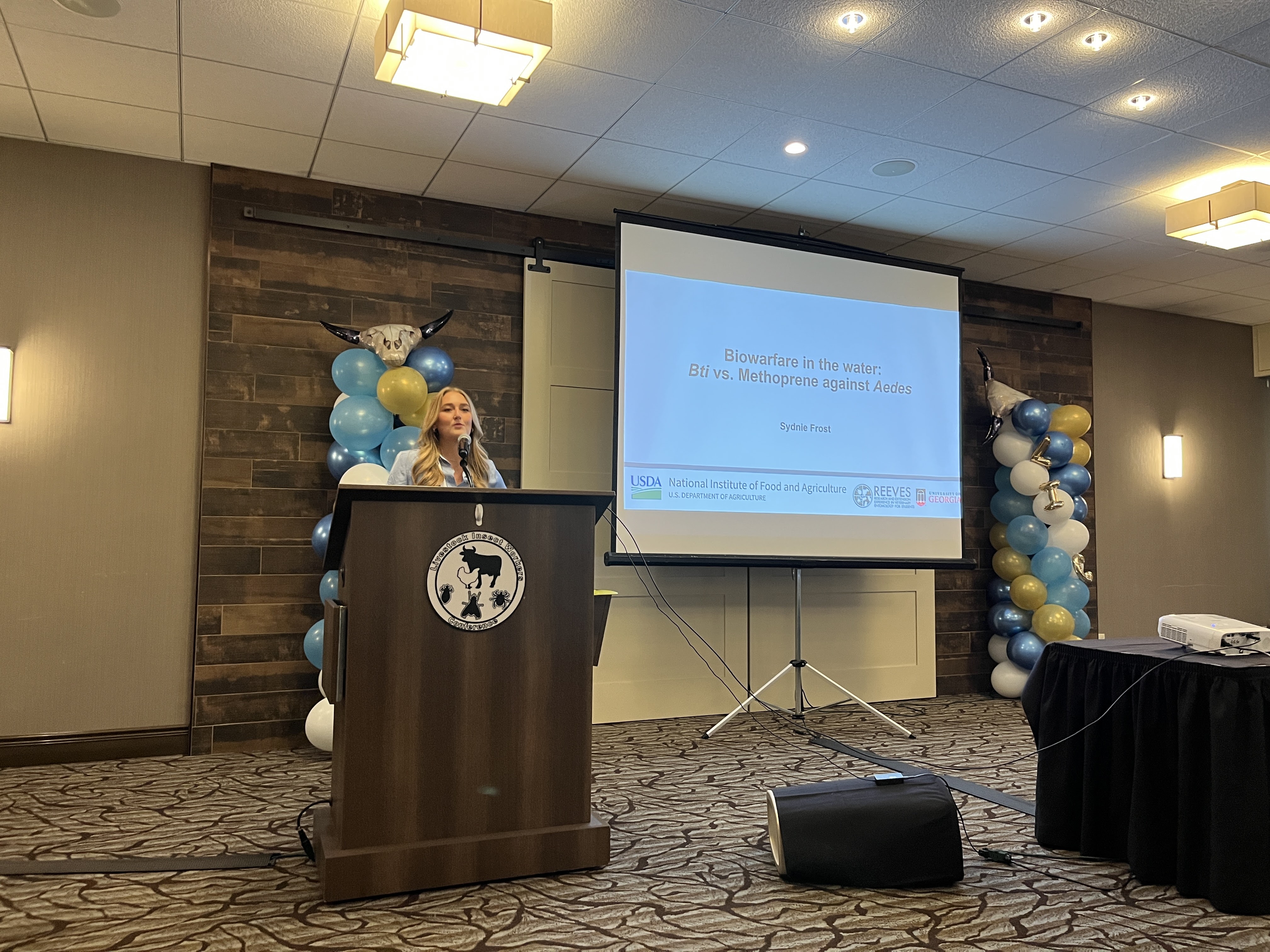
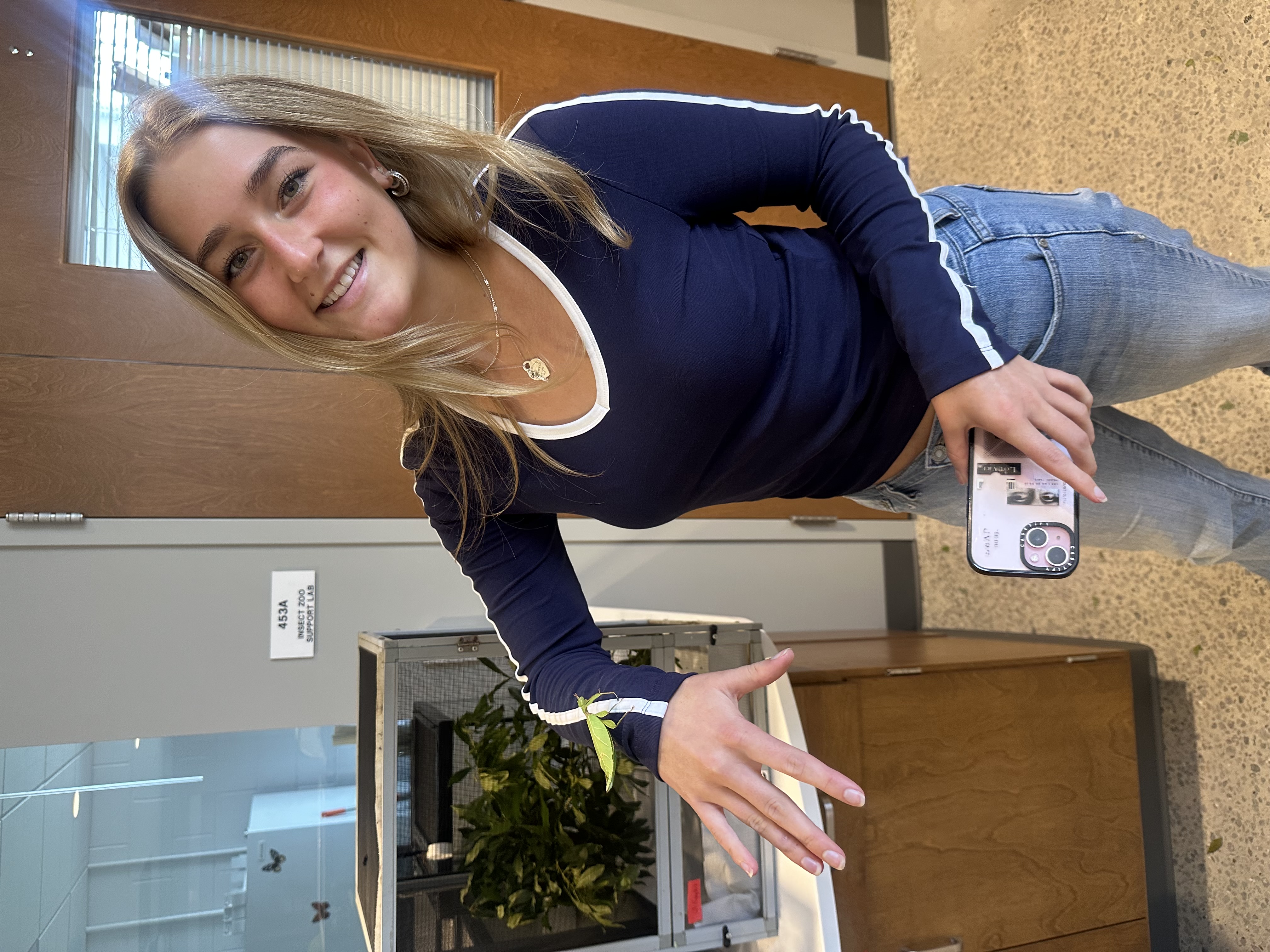
Sydney Haag - Sales and Service Intern, GENEX Cooperative (Syracuse, New York)
Sydney Haag, a senior in animal sciences with a concentration in biosciences, spent her summer as a sales and service intern with GENEX Cooperative, a cattle genetics and technology cooperative. After graduation, she plans to pursue a career in the dairy industry.
Her internship was divided into 50% sales, 40% cattle breeding and 10% consulting, where she traveled with sales managers to dairy farms, assisted with breeding and provided recommendations to improve herd performance.
Haag said the experience of being far from home is something she would recommend to other students. It exposed her to a new area and helped her gain independence.
Her favorite part of the summer was visiting different dairy operations and building relationships with producers.
“My favorite part was just being able to see a lot of different sizes and philosophies of commercial dairy operations and then just get to talk to those farm managers or farm owners,” Haag said.
Haag said she gained both hard and soft skills during her internship.
“I’d say the most important hard skill that I learned was breeding cattle — handling liquid nitrogen and breeding cattle properly,” Haag said. “In terms of soft skills, I learned how to adjust a sales pitch quickly while having a conversation, tailoring it to someone’s personality and needs on the go. I also gained a lot more background in reproduction and genetics.”


Rylie Hana - Midwest Poultry Consortium’s Center of Excellence Scholarship/Internship Program (Iowa and Michigan)
Rylie Hana, a senior in the pre-veterinary medicine concentration, participated in the Midwest Poultry Consortium’s Center of Excellence Scholarship/Internship Program this summer. Her program included six weeks of classes followed by a seven-week internship at Herbruck’s Poultry Ranch in Ionia, Michigan.
Hana completed her coursework at Iowa State University. Over the six weeks, she took three two-week, three-credit classes in poultry nutrition, avian health and poultry enterprise management. Her schedule included about eight hours a day of classroom instruction or field trips.
The program also granted her an internship, where she rotated through different areas of the operation at Herbruck’s Poultry Ranch in Ionia, Michigan.
Hana said her favorite part of the summer was experiencing a new campus and meeting new people. She also learned a lesson that shifted her perspective on career possibilities.
“I’d say when I came into Purdue, I only wanted to work with small companion animals, so I never even considered the other range of things,” Hana said. “Seeing this, I didn’t realize the number of different roles you could have in poultry. It was eye-opening to see the different pieces that go into it that I never realized, so the lesson I learned was not to limit myself.”
Hana plans to become a mixed-animal veterinarian in the future.




Sofía Hernandez - Clinical Research and Development Intern, Merck Animal Health (Rahway, New Jersey)
Sofía Hernandez, a junior in the pre-veterinary medicine concentration, spent her summer as a clinical research and development intern with Merck Animal Health, a global animal health company, in Rahway, New Jersey.
Originally from Puerto Rico, Hernandez had hoped to return home for the summer to be close to family and friends. However, when she was selected as one of only two clinical research and development interns with Merck Animal Health, she embraced the opportunity, even if it meant being farther from home.
During her internship, Hernandez helped design clinical studies for animal health products by analyzing data and reviewing information. She worked with different teams to improve protocols and reports, and she earned a “Good Clinical Practice Certification for Veterinary Clinical Trials” from Tufts University.
This experience opened Hernandez’s eyes to research outside of academia as a possible career path. She said her favorite part of the internship was the people she met and discovering the variety of careers available in animal health.
Hernandez encourages other students to apply for similar opportunities, even if the company name feels intimidating.
“I applied thinking they probably wouldn’t pick me, and that was fine,” Hernandez said. “A lot of people shy away from applying just because of the big name. But after my experience, I realized it’s so valid to just apply because you don’t lose anything. By networking and making those connections, you gain so much.”
Looking ahead, Hernandez plans to pursue a career as an avian veterinarian.




Bayleigh Huelsenbeck - Processing Operations Intern, JBS (Tolleson, Arizona)
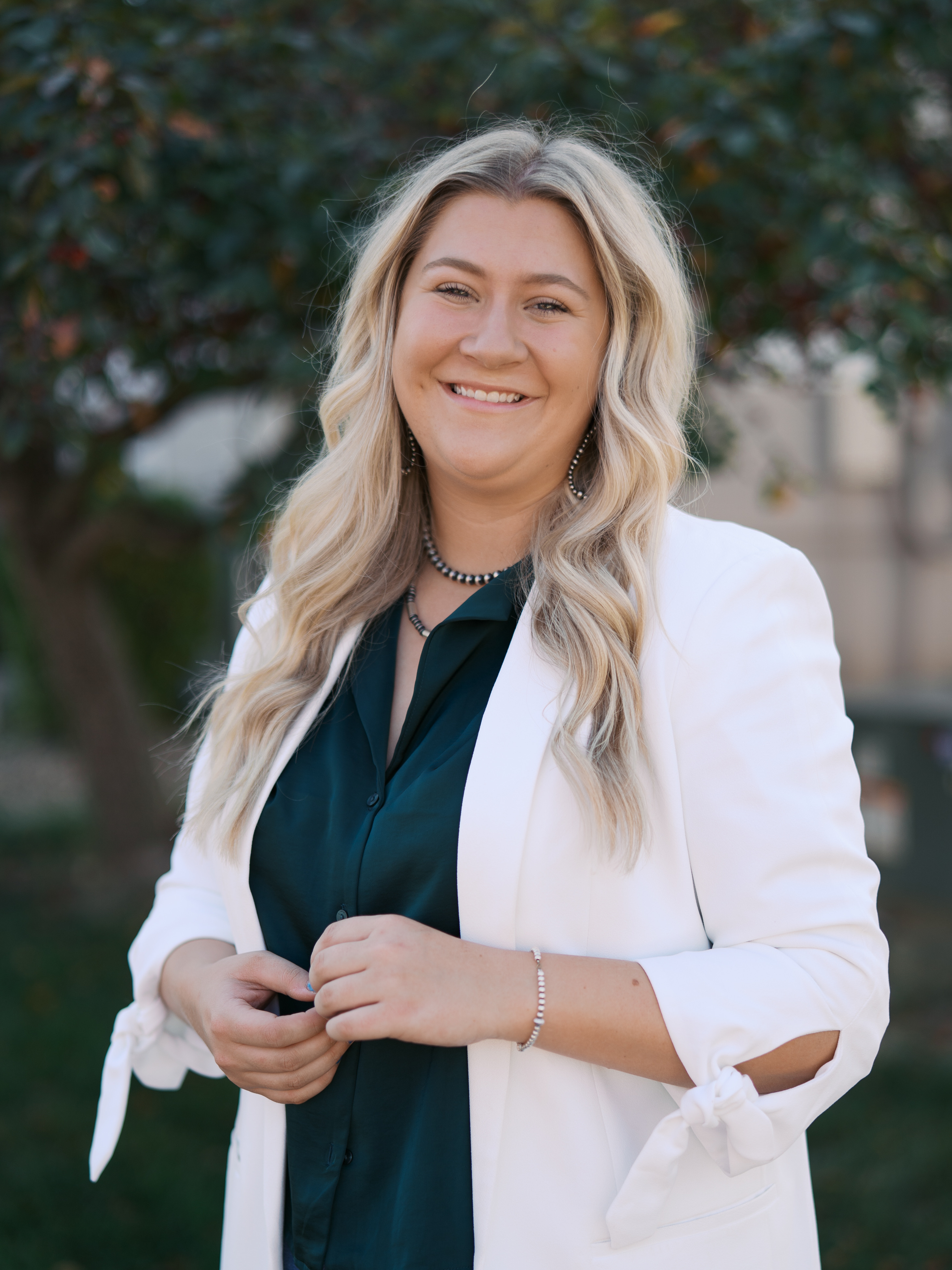 From Fort Wayne to Tolleson, Arizona, senior Bayleigh Huelsenbeck gained hands-on experience in beef processing during her internship with JBS, a global food company.
From Fort Wayne to Tolleson, Arizona, senior Bayleigh Huelsenbeck gained hands-on experience in beef processing during her internship with JBS, a global food company.
After completing training and plant walkthroughs, she was assigned a project in the value-added department. Working with an industrial engineer, Huelsenbeck analyzed and optimized the plant’s packing process.
“From the outside you notice things the employees don’t, since it’s just part of their daily routine,” Huelsenbeck said.
Huelsenbeck’s work focused on helping the packing machines keep up with the line to improve efficiency.
Huelsenbeck said living so far from home came with challenges, but it also pushed her to grow.
“It really pushed me out of my comfort zone,” Huelsenbeck said. “I learned a lot about myself, and I think that’s the most important part. If you’re comfortable, there’s no room to grow.”
Huelsenbeck’s favorite part of the summer was learning from the people around her. She encourages students to consider internships away from home, saying the experience helps them grow both professionally and personally.
Huelsenbeck’s concentration in animal sciences is animal agribusiness, and she plans to pursue a career in the cattle buying industry after graduation.
Madison Oliver - Swine Nutrition Intern, Keystone Cooperative (Reynolds, Indiana)
Madison Oliver, a senior in animal sciences with a concentration in production and industry, spent her summer as a swine nutrition intern at Keystone Cooperative in Reynolds, Indiana. She plans to enter the animal agriculture industry after graduation.
According to Oliver, she played a supervisor role in the barns.
“I had never been in a commercial hog barn until this summer, so that was awesome. I got to walk through the barns and assess their health — checking ventilation, feed, water and air quality,” Oliver said. “I also had the opportunity to network with industry professionals and pharmaceutical companies through Keystone, and I learned how to maintain and grow producer relationships, which was really cool.”
Oliver emphasized the importance of treating every day of an internship like an interview. She noted that professionalism, honesty and reliability are key to building relationships and creating future career opportunities.
Her favorite part of the internship was performing necropsies and working closely with veterinarians.
Oliver also stressed the importance of roles like hers that support the livestock life cycle, noting that while the work can be messy and often overlooked, it is essential for food production and the broader industry.



Samuel Piper - REEVES Scholar, Kansas State University (Manhattan, Kansas)
Like fellow student Sydnie Frost, senior Samuel Piper spent his summer as a REEVES (Research and Extension Experience in Veterinary Entomology for Students) Scholar. Piper, who is concentrating in pre-veterinary medicine, worked in the veterinary entomology lab at Kansas State University and plans to pursue a career in veterinary medicine.
His research focused on the effect of stable flies on cattle production in feedlots, and he had the opportunity to present his findings at the Livestock Insect Workers Conference in Cody, Wyoming. Beyond the lab, he met weekly with REEVES Scholars from three other universities to build leadership and teamwork skills.
Piper said the program helped him overcome uncertainties about undergraduate research.
“I had done some undergraduate research before, but never for a long period of time or in a one-on-one setting with a professor,” Piper said. “This experience alleviated many of my stresses and increased my interest in possibly pursuing research in the future.”
He encourages other students to consider the REEVES program, noting the unique opportunities it provides.
“It was a really well-rounded experience for research,” Piper said. “Even though it has that entomology focus, you’re still working directly adjacent to the animals through the pests that affect them. That’s something we don’t cover much at the undergraduate level.”




Sydney Slavin - Purdue Animal Sciences State Fair Education and Animal Care Intern (Indianapolis, Indiana)
Sydney Slavin, a sophomore in the pre-veterinary medicine concentration, spent her summer as a Purdue Animal Sciences State Fair Education and Animal Care intern. In this role, she educated the public about livestock and cared for animals in the Animal Town exhibits.
Slavin took the internship to gain hands-on experience and build confidence working with different livestock species, as she had little exposure before coming to Purdue. Her favorite part of the summer was bottle-feeding calves and watching chicks hatch.
Slavin credits her animal sciences coursework for preparing her to share accurate information with fairgoers.
“I enjoyed having the knowledge to confidently tell people why we do certain things and explain the production side of animals, animal welfare and ethics,” Slavin said. “I liked answering their questions a lot.”
Throughout the internship, Slavin said she learned patience and the importance of helping others understand what she knows. She encourages other animal sciences students to consider this opportunity.
“I think it’s valuable to get hands-on experience and practice sharing information in real time,” Slavin said. “We can take tests and study in class, but being in that setting teaches you so much more.”
Slavin plans to pursue a career in veterinary medicine.
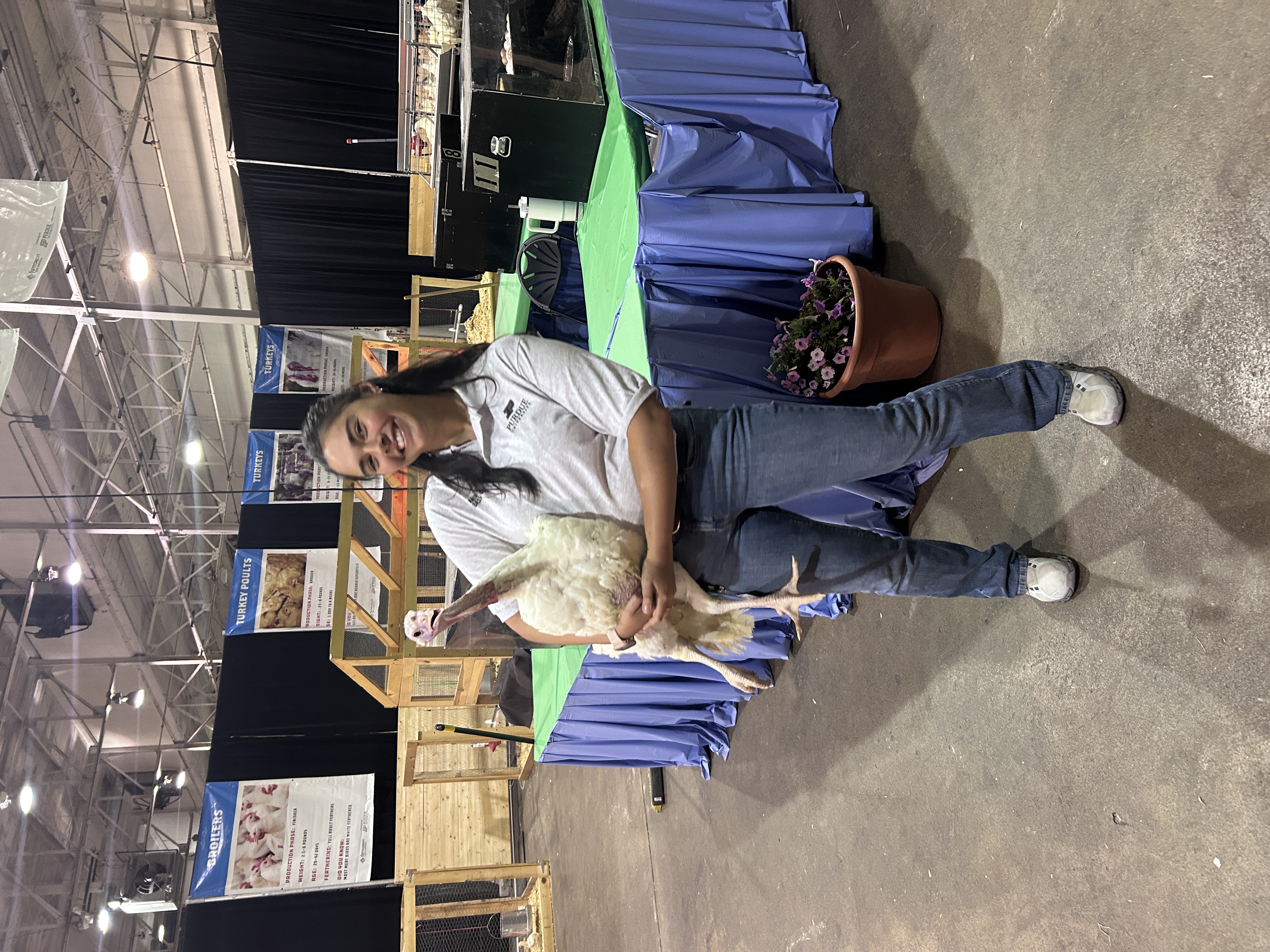
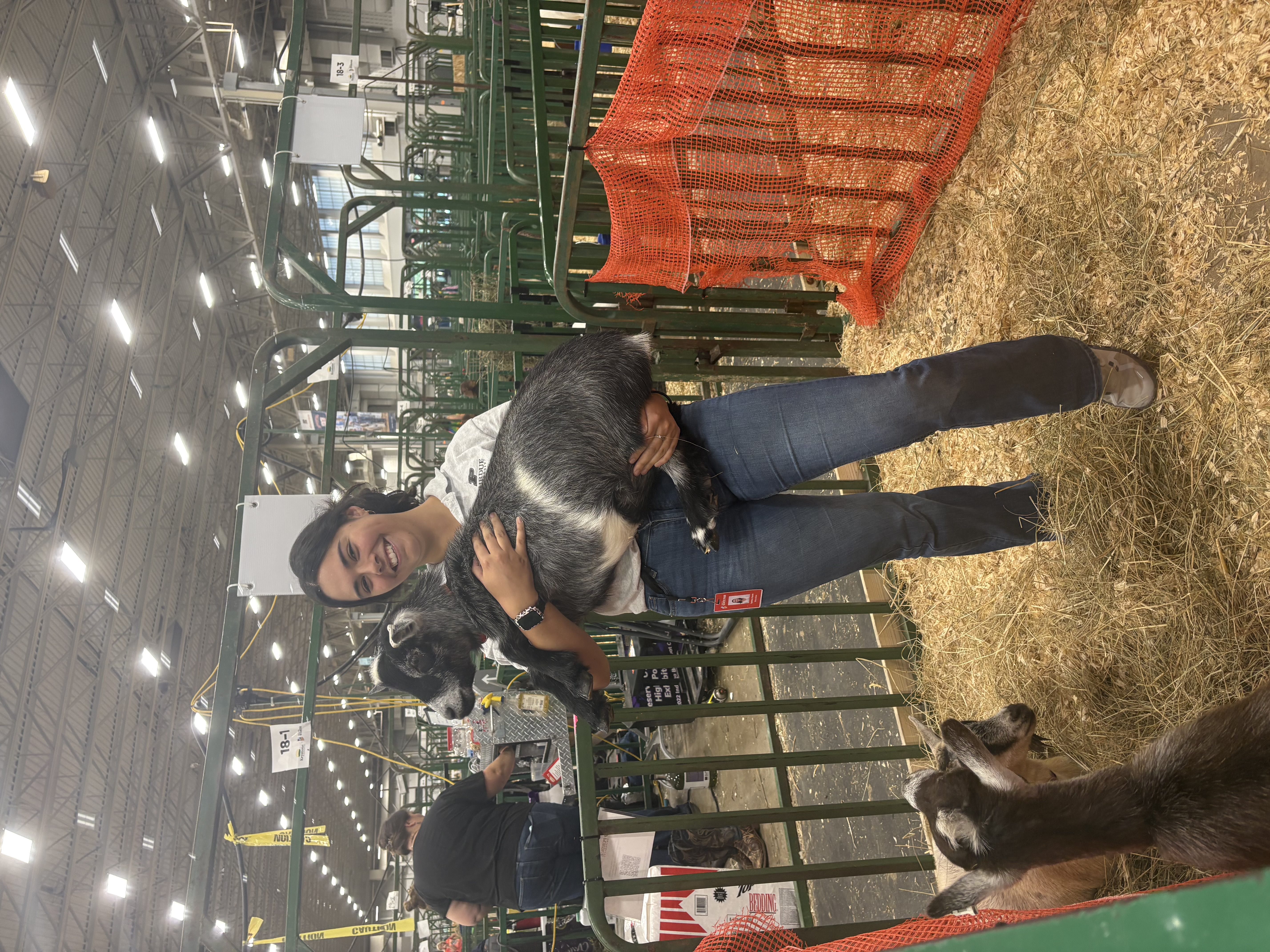
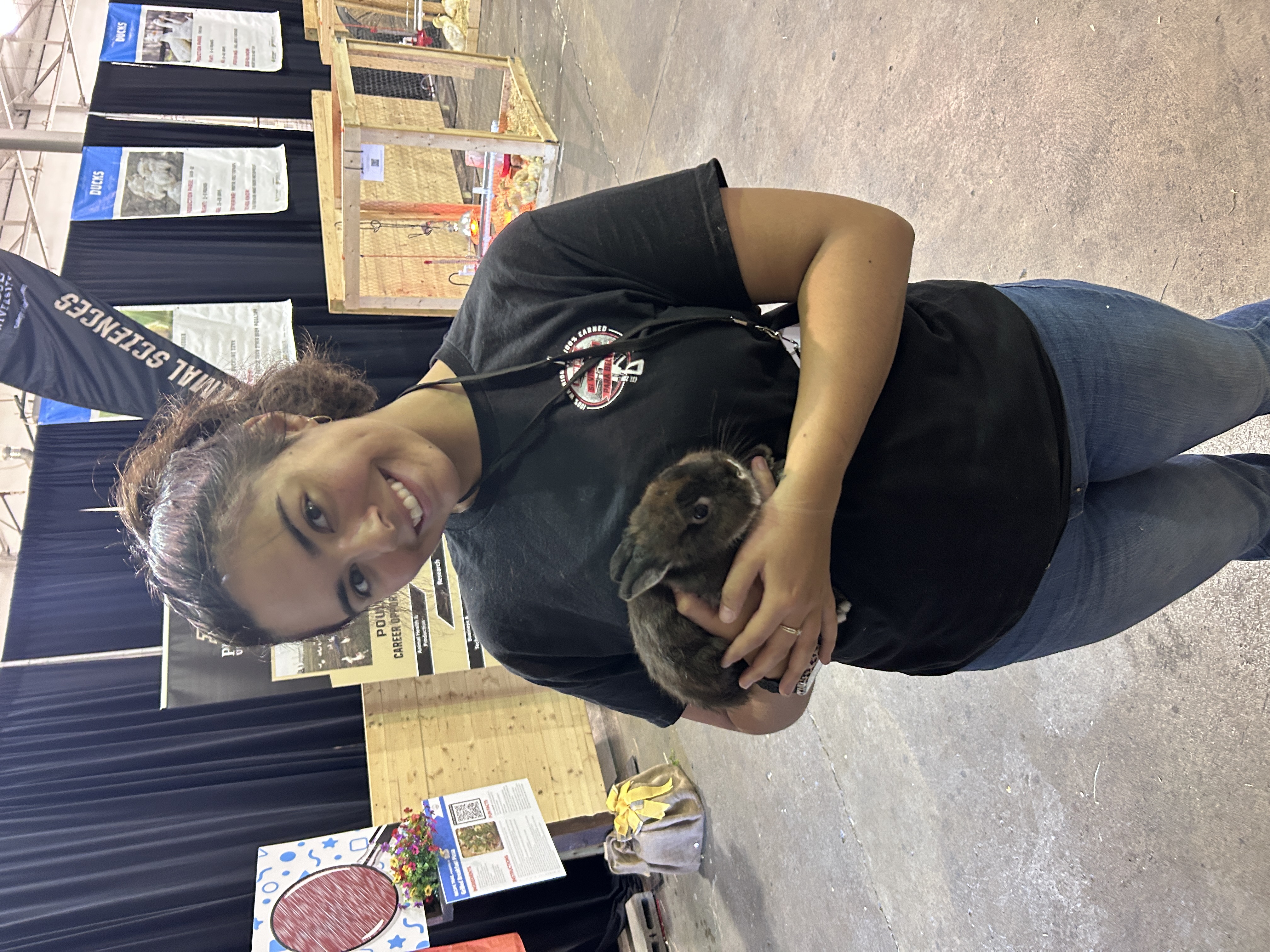
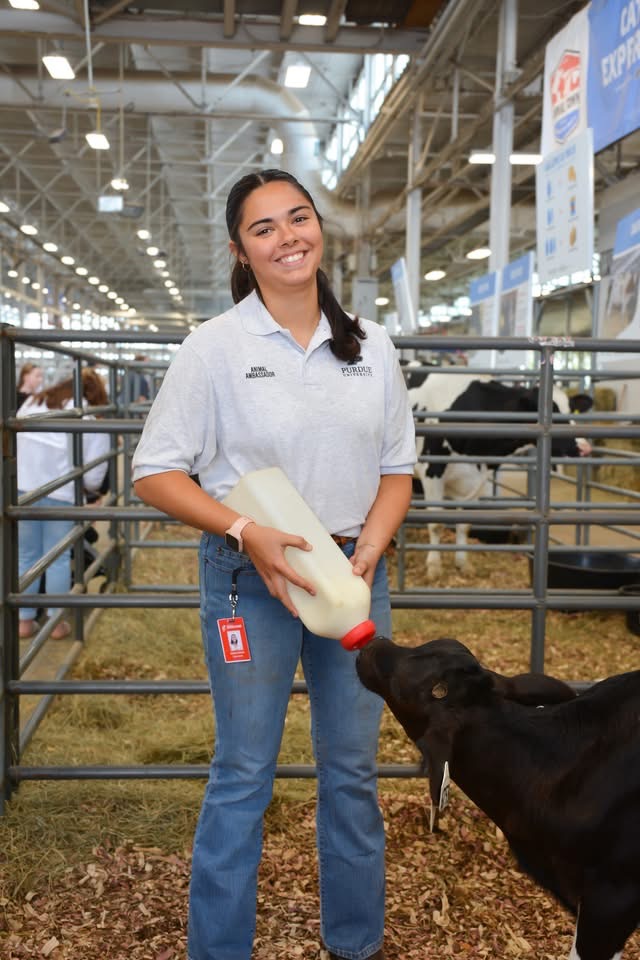
Abigail Zelt - Ranch Hand and Marketing Intern, Bear Creek Cattle Company (Evergreen, Colorado)
Senior in animal sciences Abigail Zelt spent her summer as a ranch hand and marketing intern for Bear Creek Cattle Company. With a concentration in animal agribusiness, she plans to pursue a career in the beef industry after graduation.
On the family ranch, Zelt checked and fed cattle, cared for horses, cleaned barns, helped bale and haul hay, repaired fences and worked on marketing projects. She enjoyed seeing how the cattle industry differs from Indiana, giving her a new perspective.
“The most valuable lesson I learned during my internship was that success in agriculture isn’t just about hard work. It’s about observation, adaptability and communication,” Zelt said. “Every day on the ranch taught me to read the minor signs in cattle behavior, changes in weather or shifts in pasture health and how to respond quickly and thoughtfully. I also learned how important it is to ask questions, listen carefully and build trust with those around you. That mindset will shape how I approach both cattle management and leadership going forward.”
Zelt secured her internship by reaching out to farms listed with the Colorado Cattlemen’s Association and said she ended up exactly where she wanted to be. Her favorite part was meeting people, especially at the first-ever Colorado Beef Festival in Denver, where ranchers and chefs highlighted the difference between farm-to-table and farm-to-store-to-table.
She encourages other animal sciences students to pursue internships for the valuable learning and growth they provide.





